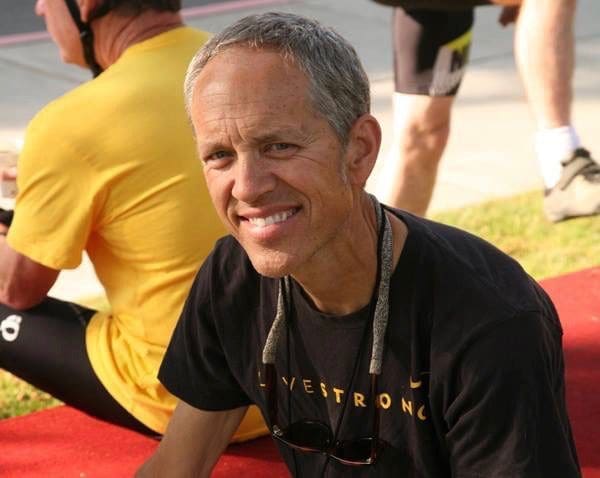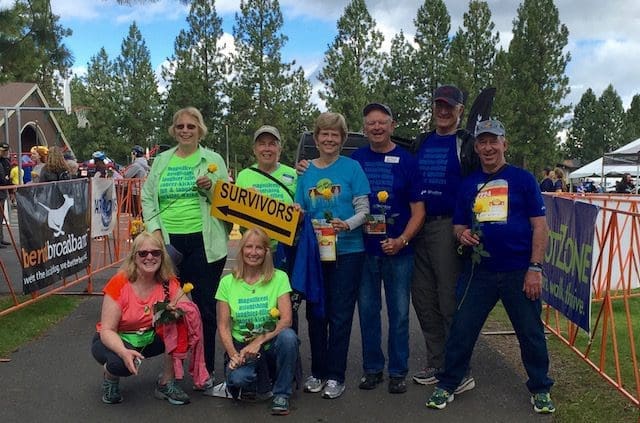After Hubby and I worked through the initial devastation—and, if I’m going to be perfectly honest here, the self-pity—we drafted a cancer team. The goal was for Hubby to live as long as possible, of course. But we also wanted quality of life for him.

Photo credit: Pixabay
Our cancer team looked a lot like this list — a dozen simple ways to get back into life while dealing with the hard:
1. Volunteer for a worthy cause. This past weekend was the annual Tour des Chutes — a multi-distance cycling event and walk/run to benefit central Oregon families dealing with cancer. Founded by cycling enthusiast and brain cancer survivor Gary Bonacker, the event has surpassed the million-dollar mark in fundraising. Which is pretty amazing for a small-town, grassroots venture. But then, my friend, Gary, is pretty amazing. Because he’s been instrumental in this endeavor with part of the brain tumor that couldn’t be removed surgically still causing havoc all these years.

Gary Bonacker
Apparently there’s plenty of science to back up the idea that volunteering is good for your mental and physical health. One study cited in a Healthy Women article, entitled “The health benefits of volunteering”, indicates that “people with chronic pain who volunteered as peer counselors found that their pain, disability and feelings of depression all lessened from volunteering.” Hubby volunteered three mornings a week at the local men’s rescue mission. And found great satisfaction in the work.
2. Try something challenging. This is referring to something you don’t really want to do, but you know you should. Sort of an Anti-Bucket List. Like public speaking. Or writing that letter of apology you should have written long ago. I’ve been doing a series of brave-making things since Hubby died: A walking tour in Switzerland, out-of-state road trips, and visiting places where Hubby and I had been together, all of which would have been so much more fun with him. (The Oregon coast is next on my brave-making list.)
3. And now for the fun stuff. Draft a list of things you’ve always wanted to do. Hike the Grand Canyon rim to rim. Bake a perfect soufflé. Learn to speak Russian. Research your family tree. I’ve always looked longingly at stand-up paddle boarders, wishing I could do this amazing thing of balancing on a surfboard while rowing standing up. And then I had the opportunity to take SUP lessons in Puerto Rico. And the board threw me overboard only once.
4. Get outdoors. I have so many fabulous memories of Hubby and me hiking the Cascades, Rockies, Tetons. Summiting a tall trail and sitting with our backs to the sun; enjoying the view, the sandwich, the fresh fruit, the handful of nuts. A Health.com article, “5 (scientific!) reasons getting outside is good for you”, maintains that just being outdoors can ease depression, improve outlook and focus, and strengthen immunity. (I’m sitting outdoors as I write this … and feeling quite healthy.)
5. Get outdoors and walk. Most of us are familiar with the benefits of physical activity — increased energy; and decreased anger, depression and stress, to name a few. And when you combine physical activity with being outdoors, that’s a double whammy to depression and stress.
6. Get outdoors and walk for a worthy cause. Yes, this. The Tour des Chutes 5K in memory of Hubby. A triple whammy: physical activity. outdoors. while raising funds for cancer survivors.
7. Get outdoors and walk for a worthy cause with a bunch of goofy people who know how to do life well after cancer. I am a life-time member of this magnificent, astonishing, laughter-filled, cancer-kicking, fun & fabulous rockstar walking posse. There are 20-some of us regulars. And believe me, they know how to do life well with and after cancer.

8. Enjoy coffee or tea with said group of goofy cancer-kicking people. An article entitled “13 proven health benefits of coffee” claims that coffee can improve energy levels, make you smarter and help burn fat. And apparently there are essential nutrients in coffee beans: Riboflavin, manganese, potassium, magnesium and niacin. Who knew? As for health benefits of tea, according to a Today.com article, “How a daily cup of tea may improve your health”, tea is an antioxidant (think anti-rust agent). Tea also may help with weight loss, protect bones, boost immune system and help battle cancer.
9. Eat healthfully. Most of us know that eating nutritiously helps control weight, improve moods, combat diseases, boost energy, improve longevity. And coupled with physical activity, it’s that much more effective. Although Hubby and I didn’t receive nutritional and physical activity encouragement where he was initially diagnosed, we somehow knew that building as strong a body as possible would help battle the onslaught of cancer and the side effects of treatment.
10. Manage stress. Hubby’s and my go-to tactic for managing stress was anything outdoors — lacing up hiking boots, strapping on snowshoes, conquering the nearby trails. Here are some other suggestions:
Wear bright colors. Scientists have found that brighter clothes make you happier. “Research shows that … when we look at certain colours it triggers neurological responses in the brain, and causes the hypothalamus gland to release hormones,” says Jules Standish, author of How Not to Wear Black.
Plant a garden. According to a Prevention article — “6 health benefits of gardening” — planting a garden can improve your health, save you money and boost your mood.
Adopt a pet. A WebMD article, “5 ways pets can improve your health”, ascertains that having a pet to care for can lower blood pressure, lessen anxiety and boost immunity. And for those who need to exercise a pet, well, there you go … getting outdoors and walking.
11. Write. Writing about personal experiences can improve mental, physical and emotional health. Dr. Timothy D. Wilson says, “Writing forces people to reconstrue whatever is troubling them and find new meaning in it.” Write out your frustrations and anger, your hopes and dreams, the things you’re grateful for. Track where you are in life and what you’re learning along the way. And see if you can’t find meaning in the hard.
12. Make a new friend. Cancer introduced Hubby and me to a full community of some of the most amazing people on the planet. My co-workers in the cancer center; the people we served; the cancer community across the country as Hubby and I traveled and shared our story. Keep your old friends, but intentionally make a new friend. You never know who might need your friendship.
* * *
You might wonder what volunteering, or getting outdoors, or eating nutritiously has to do with getting through a divorce or finding a job. The common sense answer is that if we’re doing everything we can to maintain a healthy body, it will affect our mental and emotional health, which will affect how we interact with people, which will affect our levels of success. It’s all tied together; we’re all tied together.
Hopefully you’ve noticed a trend with this list: Learning to rebuild a life after loss involves people. It involves getting off the couch, taking risks and learning new things. It involves reaching out and giving back.
What about you? I’d love to hear what things have helped you live fully in spite of loss.
P.S. If you found this post helpful or inspiring, please share, tweet or pin!

Jon L.
Marlys,
Thank you for such beautiful thoughts. If I might ask, what do you feel helped you get back into life after being a caregiver? I surely appreciate your thoughts and dedication to letting us see your journey.
Marlys Johnson
Great question, Jon. There are probably half a dozen things that motivated me, but I think it boils down to knowing that God (and my husband) would want me to live this priceless gift of life as well as possible for the remaining days on earth. Are you a caregiver? What prompted you to ask such a good question?